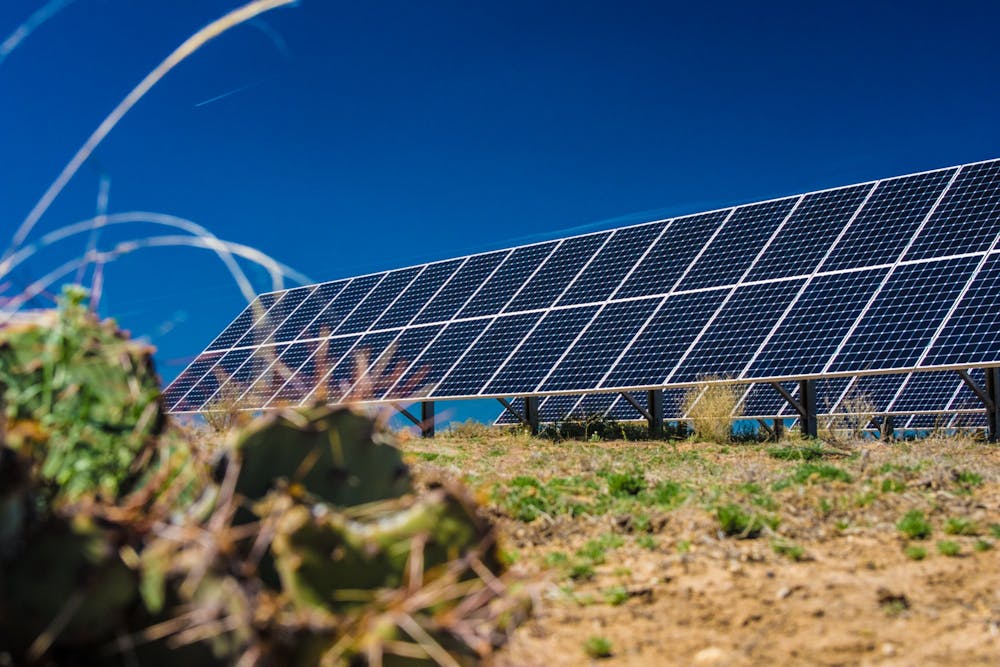On Tuesday, Jan. 31, Santa Fe county called for New Mexico state legislators and Governor Michelle Lujan Grisham to pass the Local Choice Energy Act, officially known as Senate Bill 165. A resolution in support of the legislation, sponsored by Santa Fe County Commission Chair Anna Hansen and Commissioner Camilla Bustamante, passed unanimously at Tuesday’s meeting.
The act would allow municipalities, counties and tribes to generate or purchase electricity and provide it to those in their respective service area while still utilizing the transmission service from independent providers. The act seeks to introduce choice into a market that is almost entirely dominated by investor-owned utilities, according to Alysha Shaw, campaign director for Public Power New Mexico.
Public Power New Mexico is a coalition of grassroots organizations throughout New Mexico that work to generate affordable renewable electricity which can lead to jobs and investment in local economies.
“It's a platform that enables our communities to launch renewable programs and have choices. And right now, we don't have choices,” Shaw said.
Currently, New Mexico is served by three investor-owned utilities: PNM Resources, Southwestern Public Service and El Paso Electric. Shaw believes these companies prevent the state from reaching a higher energy-renewal potential.
“New Mexico has some of the greatest renewable energy development potentials in the entire country. And yet, we're not using (it): we're barely using any of it. And (it's) partly because we live in this monopoly system,” Shaw said.
New Mexico currently ranks second in the U.S. for solar energy production potential and 10th in wind energy potential, according to New Mexico’s Office of Renewable Energy.
“I think really importantly, (it could) lead to more local control of electricity and particularly how it's generated: making sure that there's an emphasis on renewables and other forms of energy that are nonpolluting and help address our climate crisis,” Eric Olivas, Bernalillo County commissioner of District 5, said.
The legislation is similar to community choice aggregation, which exists in 10 states such as Ohio, New York and California. Other states, including neighboring Arizona and Colorado, are considering similar legislation this year, according to a press release.
If passed, the act would take effect July 1 of this year. The Public Regulation Commission would undertake rulemaking an undetermined amount of days from that date to define rules for implementing the act, according to Shaw.
Shaw said there’s plenty of support from the community as people want “something different.”
Get content from The Daily Lobo delivered to your inbox
“It's about choice, and it's about … being able to access and generate and produce renewable energy. And it's about lowering costs. And it's about having control and community control and accountability,” Shaw said.
While he deeply supports Bill 165, Olivas still sees some challenges that could come with its approval. He believes the approval would move some of the jobs from the private sector to the public sector, which is much more difficult to maintain and collect union dues because of the Janus v. AFSCME decision. The decision determined that public-sector employees are no longer forced to accept a union’s exclusive representation by law.
“If communities chose to do this, it could jeopardize the ability of work people to unionize and quickly collectively bargain. So I think that's a really big issue for me because I think it's important that working people be able to advocate for better wages and better working conditions. And so I don't want this to jeopardize them,” Olivas said.
One of the major changes from the 2021 version of the bill to the current one is that rural electric cooperatives, member-owned cooperatives who provide electricity to those in their service area, according to the Central New Mexico Electrical Cooperative. Now, the bill gives rural electric cooperatives the opportunity to opt-in to participate in local choice if they want to.
The Bernalillo County Commission voted unanimously last week in support of Local Choice Energy. Bayard and Hurley, small rural communities in the mining district in southwestern New Mexico, were the first communities to unanimously pass resolutions in support of the 2023 Local Choice Energy Act, the press release reads.
“Not every community is going to jump right on us … it'll take time. It won't happen the day after the bill has been signed into law and it's effective, but we'll see movement towards more local regional development of renewable resources that's community-controlled, which is exciting and what we're hoping for,” Shaw said.
Annya Loya is the news editor at the Daily Lobo. She can be contacted at news@dailylobo.com or on Twitter @annyaloya






